Variable Throughput and No Fear of Reagent Loss! New Plate-based Packaging for Greater Efficiency!
View: 3322 / Time: 2025-01-10
NGS has rapidly developed since 2011 due to its advantages of high throughput, low cost, and extensive target coverage, gradually being applied in clinical settings. However, traditional manual NGS workflows face several challenges, such as complex procedures, high expertise requirements for operators, low throughput per operation, and the risk of cross-contamination in open working environments. These issues have led to a growing demand for high-quality NGS automation workstations in many laboratories to extend unattended operation time and reduce labor and time costs.
NadAuto-16R Fully-automated NGS Workstation was developed to address these challenges. Its launch stems from Nanodigmbio's deep understanding of the entire NGS reagent process and insights into the challenges of wet lab operations. Specifically designed for NGS applications, it aims to provide more efficient and precise experimental tools to meet the market's demand for high-throughput and high-quality experiments.
Previously, we provided a detailed introduction to the NadAuto-16R Fully-automated NGS Workstation and its reagent application solutions (New Arrival | Official Release of Fully-automated End-to-End NGS Solution Based on NadAuto-16R - Company News - Nanodigmbio Pte. Ltd.). Recently, Nanodigmbio has launched the plate-based packaging reagents for pre-library preparation and hybridization capture designed specifically for NadAuto-16R to further shorten reagent preparation time and optimize the operating experience. This design pre-loads all reagents into standard plates, significantly reducing manual placement and pipetting operations. This not only effectively minimizes the risk of human error but also greatly enhances experimental efficiency, allowing users to perform automated operations more smoothly.

Figure 1. Entire process of pre-library preparation and rapid hybridization capture (plate-based packaging) on NadAuto-16R.
02 Optimized Highlights of Plate-based Packaging Reagents
• Significantly reduces reagent preparation time: Experiments can be started within 10 min.
• Shortens automation runtime: Eliminates lengthy reagent aliquoting steps, reducing operation time by 5%-8%*.
• Flexible throughputs adaptability: Supports variable sample numbers to meet different throughput requirements for library preparation.
• Aluminum foil heat-sealing packaging: Ensures sealing and stability during transportation and storage.
• No concerns about reagent loss.
• Saves storage space.
*Note: The automation runtime for pre-library preparation is calculated based on 30-min enzymatic digestion and 6 cycles of amplification; the automation runtime for rapid hybridization capture is calculated based on 1-hr hybridization and 14 cycles of amplification.
03 Plate-based Packaging Reagent Solutions
Currently, the first batch of plate-based packaging reagents for pre-library preparation and hybrid capture applied on NadAuto-16R Fully-automated NGS workstation, are shown in the figure below:

*Supporting 1-8 or 1-16 variable throughput.

Figure 2. Plate-based packaging example of NadPrep EZ DNA Library Preparation Kit Plate, 8 rxn.
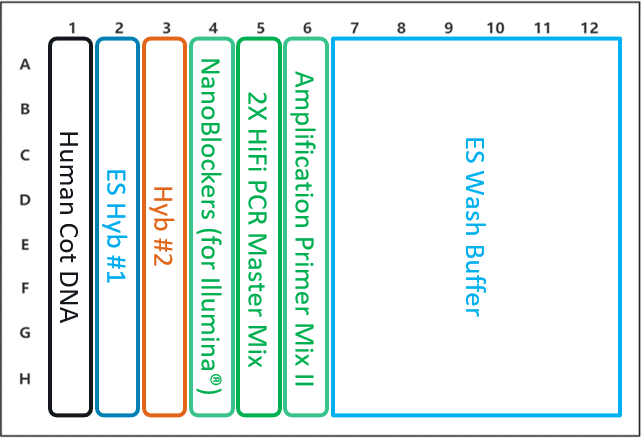

Figure 3. Plate-packaged example of NadPrep ES Hybrid Capture Reagents Kit Plate (for Illumina®), 8 rxn.
04 Performance
4.1 4-/8-samples Using Enzymatic Digestion for Pre-library Preparation
Using NadPrep EZ DNA Library Preparation Kit Plate (for Illumina®) in combination with the built-in script of NadAuto-16R, multi-batch library preparation tests were conducted for 4- and 8-samples (Promega, G1471). The results showed that library yield exhibited high stability across different batches, with an average library yield of over 1,200 ng and a CV value maintained below 7% (Figure 4.A). Additionally, the insert size distribution was within the expected range, consistent with the recommended parameters in the user manual (Figure 4.B).
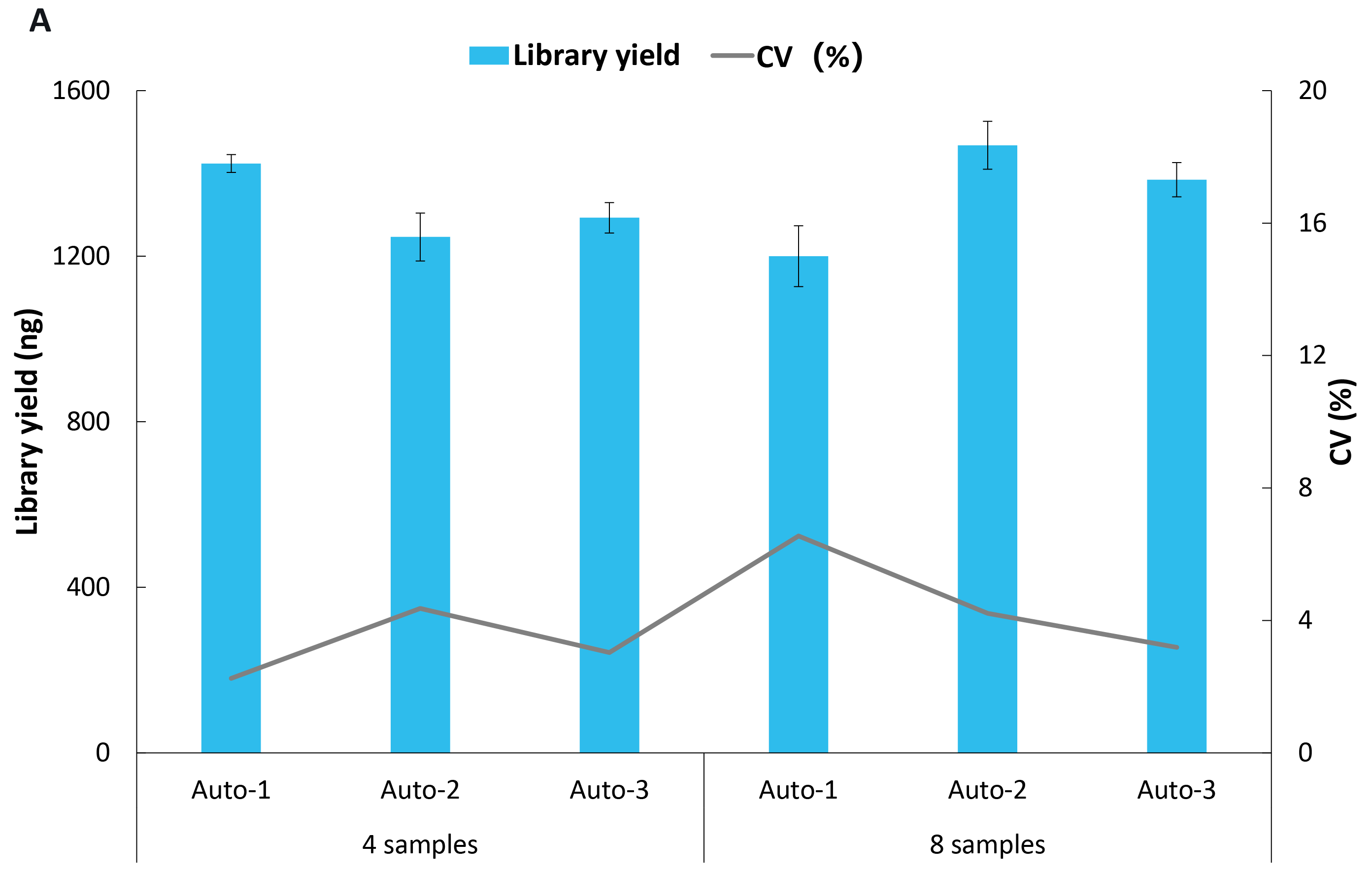

Figure 4. Multiple-batch whole-genome library yield and size distribution of NadPrep EZ DNA Library Preparation Kit Plate. A. Library yield; B. Insert size distribution.
Note: Samples are human genomic DNA (Promega, G1471), with the input amount of 50 ng.
4.2 4-/8-/16-samples for Pre-library Co-preparation
Using NadPrep RNA & DNA Library Co-Preparation Kit Plate (for Illumina®) in combination with the built-in script of NadAuto-16R, multi-batch RNA & DNA co-preparation library tests were conducted on 4-, 8-, and 16-samples (mixed nucleic acids). The results showed that the library yield was highly stable across different batches, with an average library yield of over 1,200 ng and a CV value below 10% (Figure 5.A). In addition, the insert size distribution was within the expected range and consistent with the recommended parameters in the user manual (Figure 5.B).
4.3 4-/8- Reactions for Rapid Hybridization Capture
Using the built-in scripts of NadAuto-16R, 2-hr rapid hybridization reactions were conducted for 4 and 8 throughput (500 ng/pre-library input, 1-plex, LungCancer Panel v1.0). The results showed that the average on-target rate of the capture data remained above 72%, meeting expectations (Figure 6.A). The 0.2x mean depth coverage of the target region reached 99%, and the 0.5x mean depth coverage was 94%. The Fold 80 was well-controlled below 1.5, demonstrating excellent coverage uniformity (Figure 6.B). Notably, in 4 independent batches of hybridization capture, all the 24 reactions show no significant GC bias (Figure 6.C-F).
End-to-End Fully Automated NGS Solution of Nanodigmbio provides comprehensive automation support, from workstations to validated reagents and consumables, forming a complete library preparation and targeted capture solution. This one-stop service helps improve the quality and efficiency of your library preparation workflow. Stay tuned for more plate-packaged reagent workflows to be launched soon!

NadAuto-16R Fully-automated NGS Workstation was developed to address these challenges. Its launch stems from Nanodigmbio's deep understanding of the entire NGS reagent process and insights into the challenges of wet lab operations. Specifically designed for NGS applications, it aims to provide more efficient and precise experimental tools to meet the market's demand for high-throughput and high-quality experiments.

Previously, we provided a detailed introduction to the NadAuto-16R Fully-automated NGS Workstation and its reagent application solutions (New Arrival | Official Release of Fully-automated End-to-End NGS Solution Based on NadAuto-16R - Company News - Nanodigmbio Pte. Ltd.). Recently, Nanodigmbio has launched the plate-based packaging reagents for pre-library preparation and hybridization capture designed specifically for NadAuto-16R to further shorten reagent preparation time and optimize the operating experience. This design pre-loads all reagents into standard plates, significantly reducing manual placement and pipetting operations. This not only effectively minimizes the risk of human error but also greatly enhances experimental efficiency, allowing users to perform automated operations more smoothly.

Figure 1. Entire process of pre-library preparation and rapid hybridization capture (plate-based packaging) on NadAuto-16R.
02 Optimized Highlights of Plate-based Packaging Reagents
• Significantly reduces reagent preparation time: Experiments can be started within 10 min.
• Shortens automation runtime: Eliminates lengthy reagent aliquoting steps, reducing operation time by 5%-8%*.
• Flexible throughputs adaptability: Supports variable sample numbers to meet different throughput requirements for library preparation.
• Aluminum foil heat-sealing packaging: Ensures sealing and stability during transportation and storage.
• No concerns about reagent loss.
• Saves storage space.
*Note: The automation runtime for pre-library preparation is calculated based on 30-min enzymatic digestion and 6 cycles of amplification; the automation runtime for rapid hybridization capture is calculated based on 1-hr hybridization and 14 cycles of amplification.
03 Plate-based Packaging Reagent Solutions
Currently, the first batch of plate-based packaging reagents for pre-library preparation and hybrid capture applied on NadAuto-16R Fully-automated NGS workstation, are shown in the figure below:

*Supporting 1-8 or 1-16 variable throughput.

Figure 2. Plate-based packaging example of NadPrep EZ DNA Library Preparation Kit Plate, 8 rxn.


Figure 3. Plate-packaged example of NadPrep ES Hybrid Capture Reagents Kit Plate (for Illumina®), 8 rxn.
04 Performance
4.1 4-/8-samples Using Enzymatic Digestion for Pre-library Preparation
Using NadPrep EZ DNA Library Preparation Kit Plate (for Illumina®) in combination with the built-in script of NadAuto-16R, multi-batch library preparation tests were conducted for 4- and 8-samples (Promega, G1471). The results showed that library yield exhibited high stability across different batches, with an average library yield of over 1,200 ng and a CV value maintained below 7% (Figure 4.A). Additionally, the insert size distribution was within the expected range, consistent with the recommended parameters in the user manual (Figure 4.B).


Figure 4. Multiple-batch whole-genome library yield and size distribution of NadPrep EZ DNA Library Preparation Kit Plate. A. Library yield; B. Insert size distribution.
Note: Samples are human genomic DNA (Promega, G1471), with the input amount of 50 ng.
4.2 4-/8-/16-samples for Pre-library Co-preparation
Using NadPrep RNA & DNA Library Co-Preparation Kit Plate (for Illumina®) in combination with the built-in script of NadAuto-16R, multi-batch RNA & DNA co-preparation library tests were conducted on 4-, 8-, and 16-samples (mixed nucleic acids). The results showed that the library yield was highly stable across different batches, with an average library yield of over 1,200 ng and a CV value below 10% (Figure 5.A). In addition, the insert size distribution was within the expected range and consistent with the recommended parameters in the user manual (Figure 5.B).
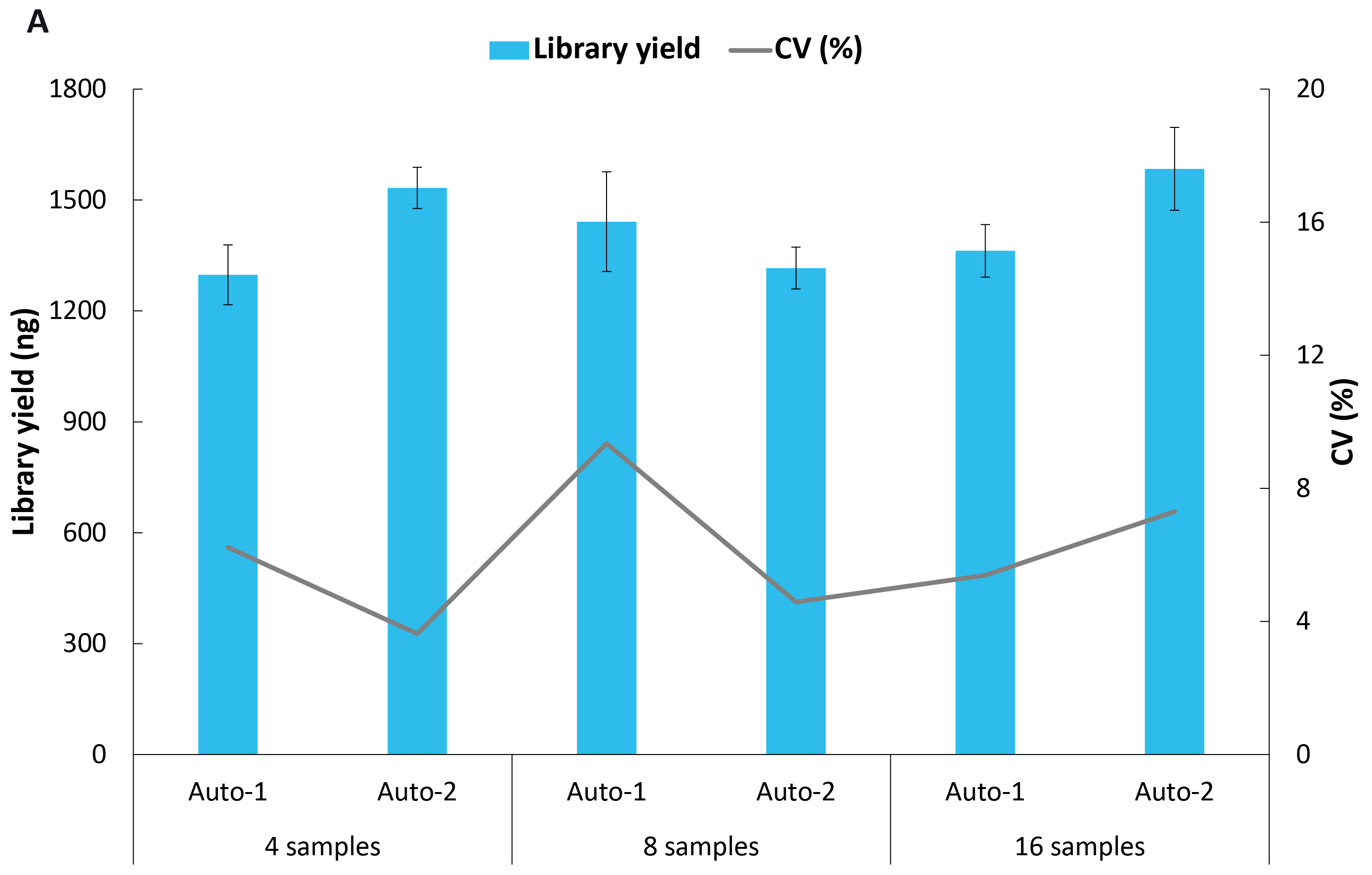

Figure 5. Multiple-batch whole-genome library yield and size distribution of NadPrep RNA & DNA Library Co-Preparation Kit Plate. A. Library yield; B. Insert size distribution.
Note: Samples are Human Brain Total RNA Standard (Clontech, 636530) and Human Genomic DNA Standard (Promega, G1521) mixed at a 1:1 ratio, with the input amount of 100 ng.4.3 4-/8- Reactions for Rapid Hybridization Capture
Using the built-in scripts of NadAuto-16R, 2-hr rapid hybridization reactions were conducted for 4 and 8 throughput (500 ng/pre-library input, 1-plex, LungCancer Panel v1.0). The results showed that the average on-target rate of the capture data remained above 72%, meeting expectations (Figure 6.A). The 0.2x mean depth coverage of the target region reached 99%, and the 0.5x mean depth coverage was 94%. The Fold 80 was well-controlled below 1.5, demonstrating excellent coverage uniformity (Figure 6.B). Notably, in 4 independent batches of hybridization capture, all the 24 reactions show no significant GC bias (Figure 6.C-F).
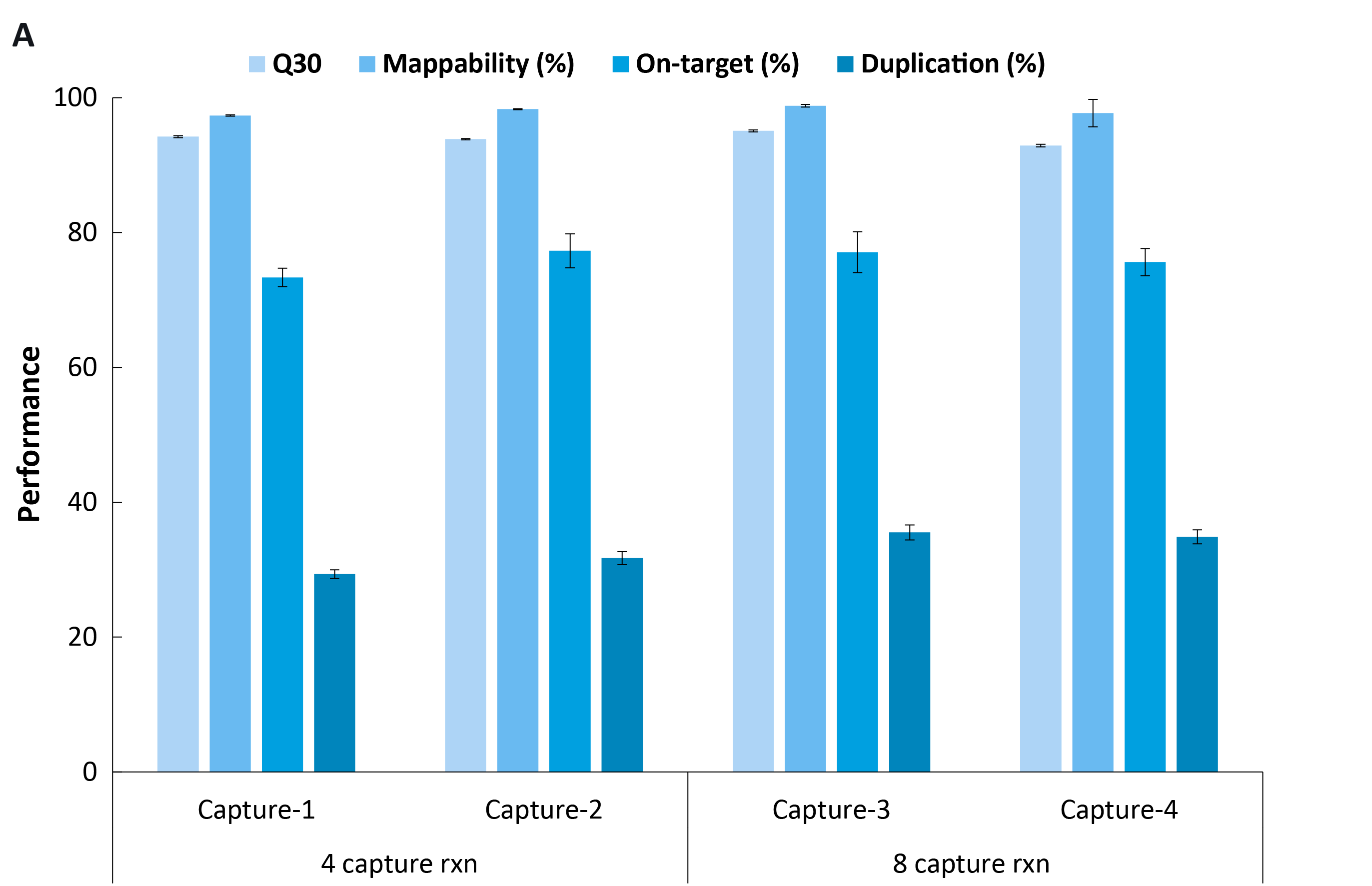


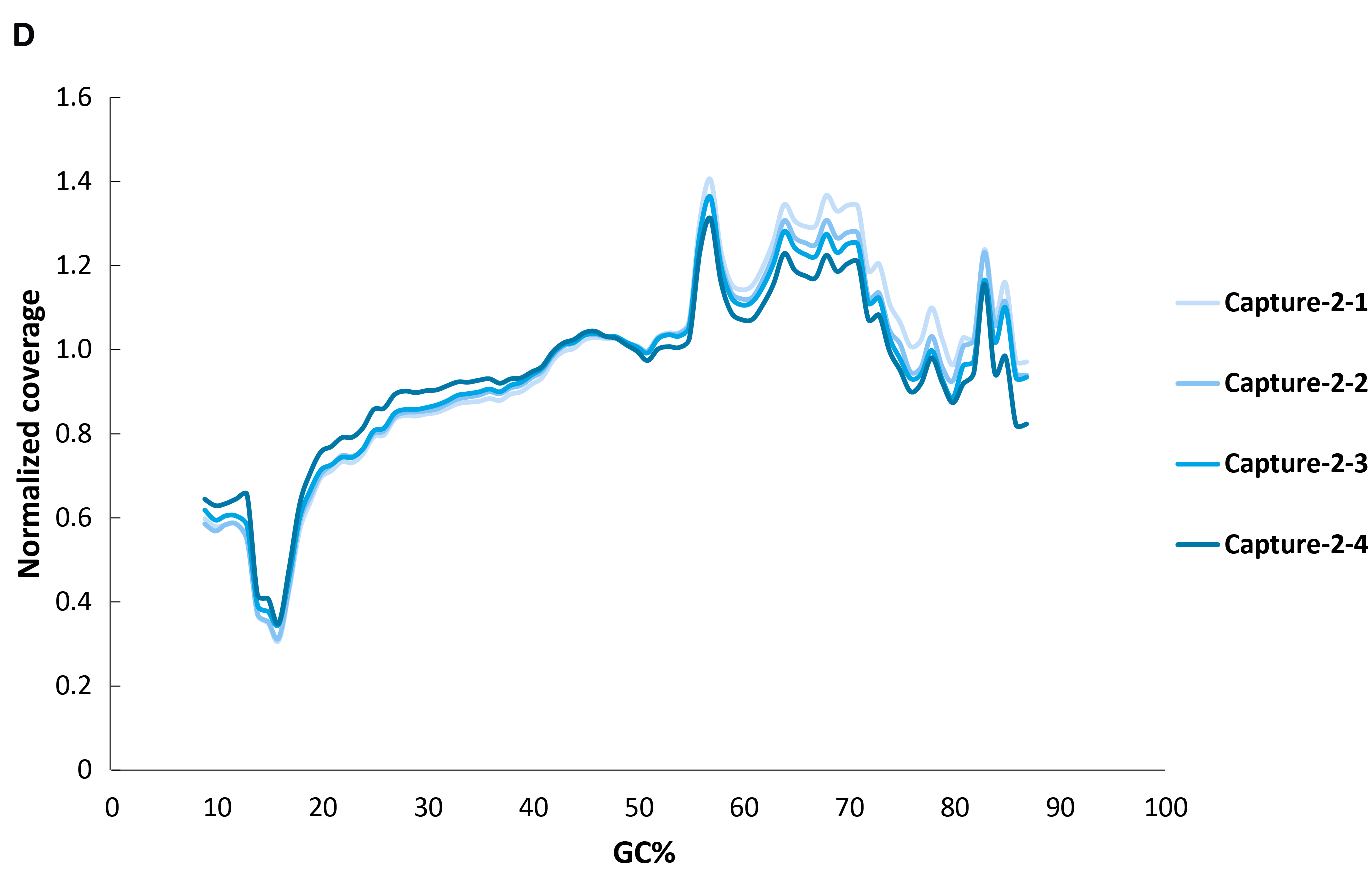
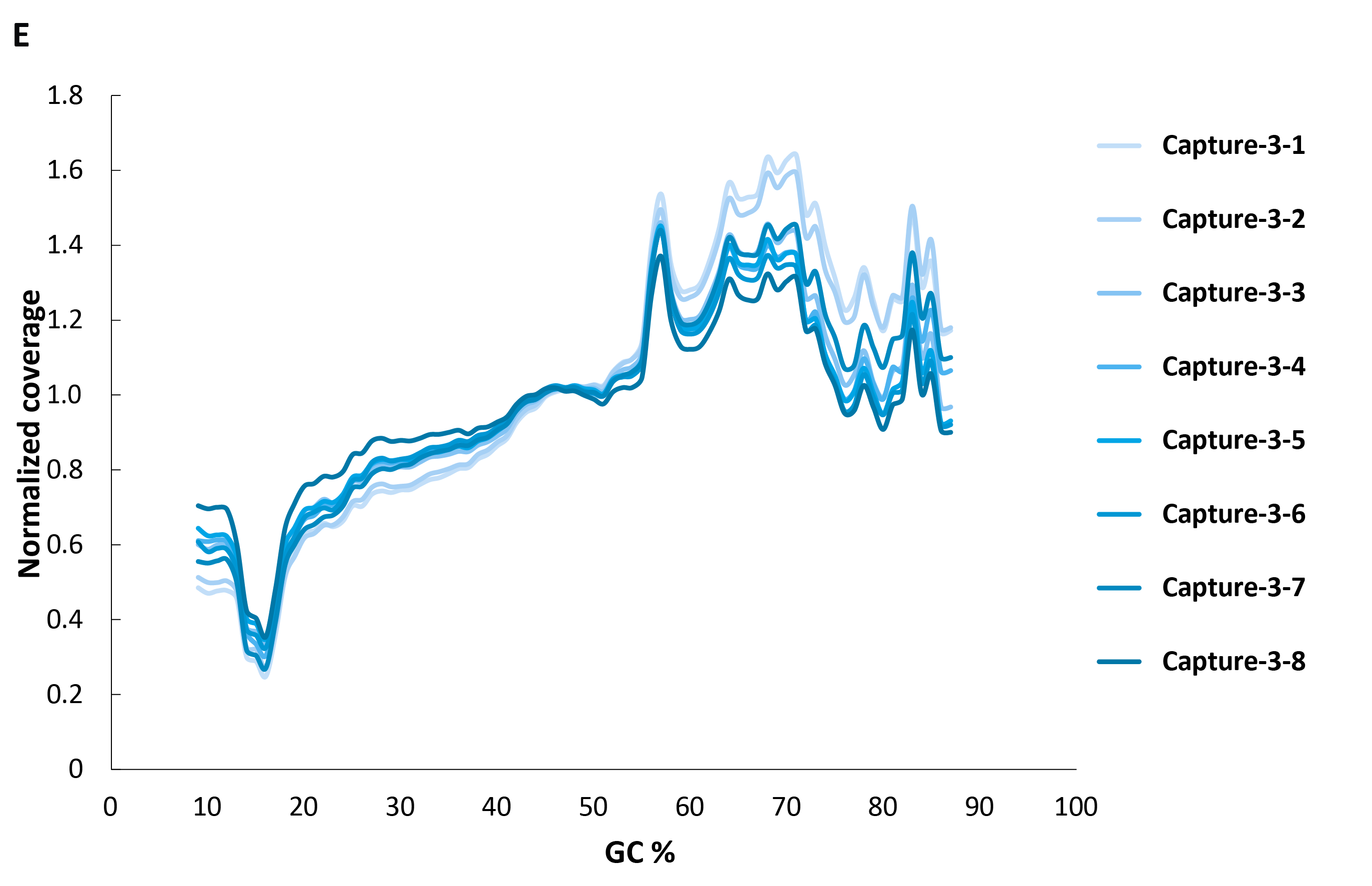
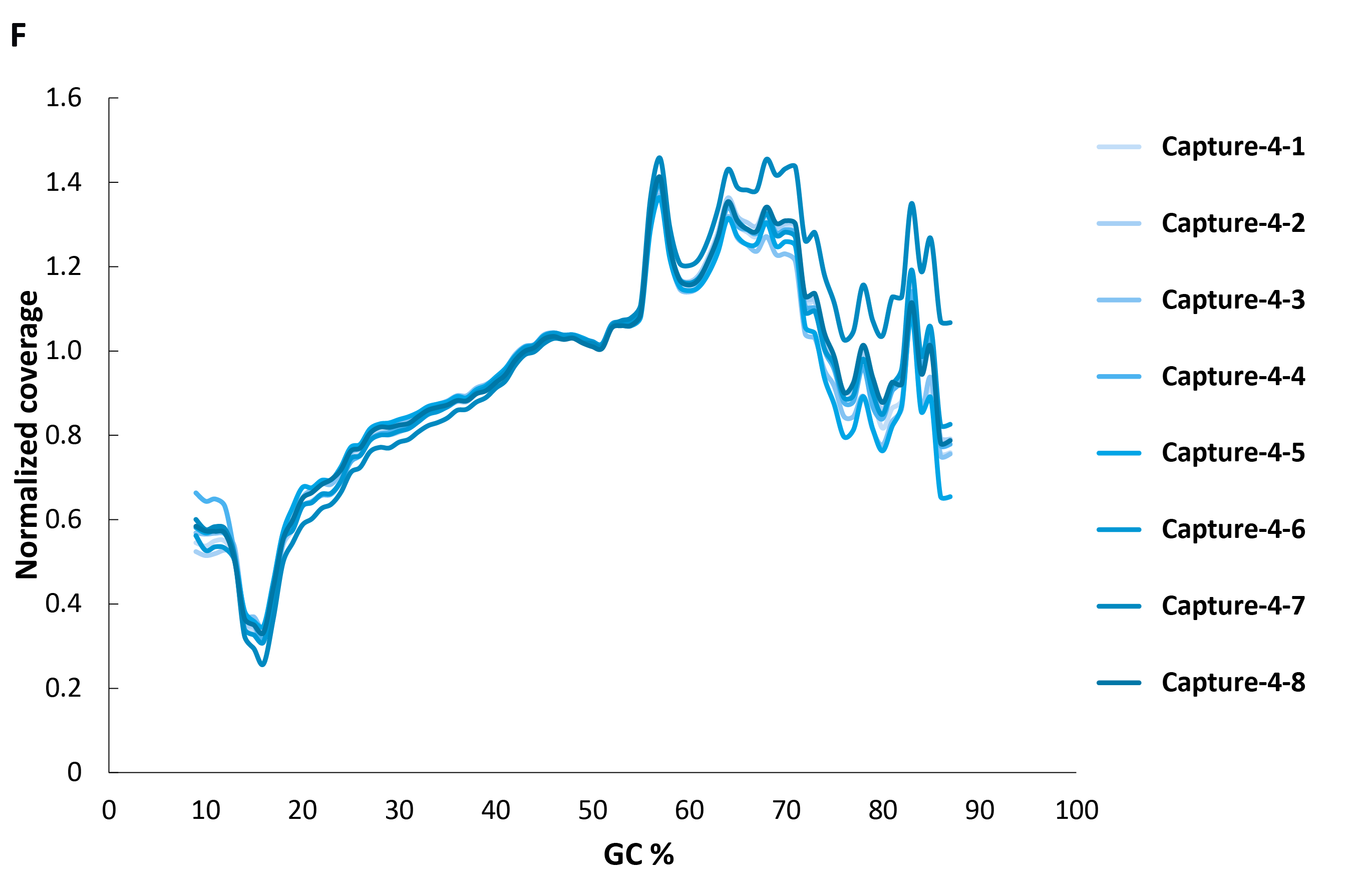
Figure 6. Capture performance of NadPrep ES Hybrid Capture Reagents Kit Plate. A. Q30, Mappability, On-target rate, Duplication; B. Target covered; C-F. GC bias. Each batch consists of 4/8 reactions.
End-to-End Fully Automated NGS Solution of Nanodigmbio provides comprehensive automation support, from workstations to validated reagents and consumables, forming a complete library preparation and targeted capture solution. This one-stop service helps improve the quality and efficiency of your library preparation workflow. Stay tuned for more plate-packaged reagent workflows to be launched soon!

Solutions
- Methyl Library Preparation Total Solution
- Sequencing single library on different platform--Universal Stubby Adapter (UDI)
- HRD score Analysis
- Unique Dual Index for MGI platforms
- RNA-Cap Sequencing of Human Respiratory Viruses Including SARS-CoV-2
- Total Solution for RNA-Cap Sequencing
- Total Solution for MGI Platforms
- Whole Exome Sequencing
- Low-frequency Mutation Analysis
Events
-
Exhibition Preview | Nanodigmbio invites you to join us at Boston 2025 Annual Meeting of the American Society of Human Genetics (ASHG)

-
Exhibition Preview | Nanodigmbio Invites You to Join Us at WHX & WHX Labs Kuala Lumpur 2025, Malaysia International Trade and Exhibition Centre in Kuala Lumpur

-
Exhibition Preview | Nanodigmbio Invites You to Join Us at Hospitalar 2025, Brazil International Medical Device Exhibition in São Paulo
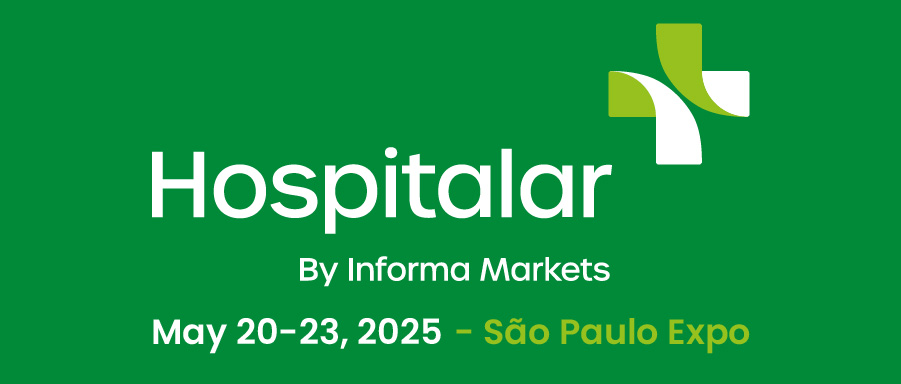
-
Exhibition Preview | Nanodigmbio invites you to join us at Denver 2024 Annual Meeting of the American Society of Human Genetics (ASHG)

-
Exhibition Preview | Nanodigmbio invites you to join us at Sapporo 2024 Annual Meeting of the Japan Society of Human Genetics (JSHG)

-
Exhibition Preview | Nanodigmbio invites you to join us at Association for Diagnostics & Laboratory Medicine (ADLM)


